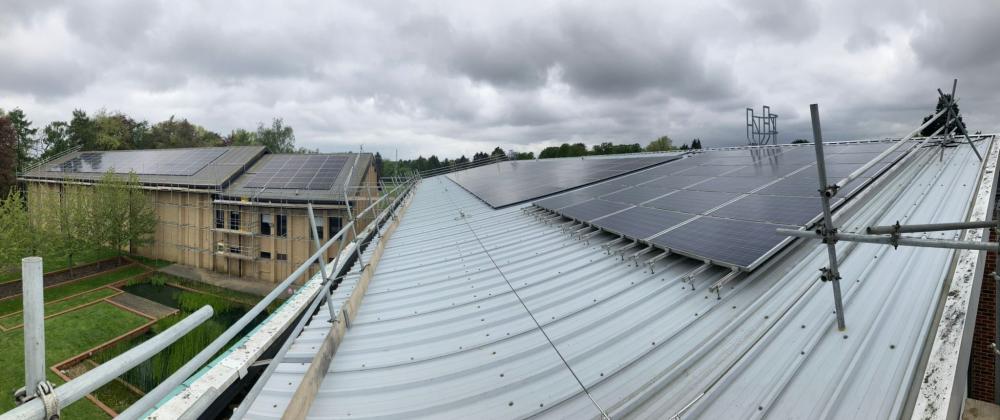East Midlands university celebrates progress towards net zero 2040 target
We visited the University of Leicester to discuss how decarbonisation projects are improving vital facilities with links to mental and physical wellbeing.
Located in the East Midlands, the University of Leicester educates around 20,000 students from more than 140 countries every year.
With an ambition to reach net zero by 2040, the university considers decarbonising its diverse estate a top priority. To support this, it has been completing decarbonisation and energy efficiency projects for nearly two decades.
Our teams visited the university to discuss how a recent Public Sector Decarbonisation Scheme project has supported progression against this target.
Molly Evanson, our client support officer who has been supporting the university, said: “It was great to visit the university and meet with the experts driving these ambitious schemes.
“Our visit to the Attenborough Arts Centre and Roger Bettles Sports Centre clearly demonstrated and showcased the importance of decarbonising these facilities for the university and the wider Leicester community communities that they serve.”
Chrispal Anand, university head of carbon and energy, said: "The university is focused on its environmental sustainability impacts and committed to reducing its carbon emissions to reach net zero by 2040.
"Heat decarbonisation (transition away from fossil fuel) along with energy demand reduction and onsite energy generation are fundamental towards our net zero carbon journey.
"This is our first retrofit heat decarbonisation investment (part-funded by Phase 3b of the Public Sector Decarbonisation Scheme) at the university and the lessons learnt will lay good foundations for our future heat decarbonisation projects and strategy.”
This is our first retrofit heat decarbonisation investment (part-funded by Phase 3b of the Public Sector Decarbonisation Scheme) at the university and the lessons learnt will lay good foundations for our future heat decarbonisation projects and strategy.
The project we visited focused on the removal of gas-based heating system at both buildings in place of four low-emission air source heat pumps. Accompanying energy efficiency measures were also incorporated with LED lighting and building management system upgrades. Additionally, more than 200 solar panels were installed atop the sports centre.
The project has received more than £530,000 in funding through Phase 3b of the Public Sector Decarbonisation Scheme. Our teams at Salix deliver the funding for this scheme on behalf of the Department for Energy Security and Net Zero.
The Attenborough Arts Centre is one of the UK’s leading centres in contemporary art. Its patrons include artistic director Michael Attenborough and leading contemporary visual artist Grayson Perry. The centre has a mission to make culture and creativity accessible to all through diverse programmes which engage more than 24,000 people annually.
Located in the heart of the Oadby Student Village, the Roger Bettles Sports Centre is a popular community facility and home to a gym and fitness centre, tennis courts and a pool and sauna.
Molly added: “The venues lie at the heart of the community, providing students, staff and members of the public alike an opportunity to engage in physical and creative activities that support their physical and mental wellbeing.”
The venues lie at the heart of the community, providing students, staff and members of the public alike an opportunity to engage in physical and creative activities that support their physical and mental wellbeing.
Works completed through this phase of the Public Sector Decarbonisation Scheme have been supplemented through earlier projects completed through the Low Carbon Skills Fund and England Recycling Fund. We also deliver funding for these government schemes on behalf of the Department for Energy Security and Net Zero.
Through its England Recycling Fund, the university was able to complete more than 70 energy efficiency projects worth a total loan value of more than £3.4 million. Energy efficiency upgrades support a building to reduce its overall energy demand when performing the same task and achieving the same result. Projects largely centred around LED upgrades, but also incorporated insulation, computer and IT management, motor controls and more.
Additionally, the university was awarded £2 million in funding through Phase 1 of the Public Sector Decarbonisation Scheme which allowed for various energy efficiency upgrades to be implemented across its campuses. Measures implemented under Phase 1 included building management system upgrades, transformer replacements, lighting controls and upgrading refrigeration units.
Mitch Thomas, our client support officer who has supported the university’s recycling fund projects, said: “Initial projects completed through the university’s recycling fund have been hailed as creating the foundations upon which it has been able to accelerate its decarbonisation plan.
“Additionally, funding received through the Low Carbon Skills Fund has supported it to generate the robust decarbonisation plans that it is now putting into action as capital works programmes such as the programme of works implemented through Phase 3b.”
To technically complete, the Phase 3b project still has one final milestone to tick off. This will come through the installation of electrical switchboards for the air source heat pumps. Unfortunately, delays in the delivery of this item have set back completion. However, university staff have been able to implement a manual work-around to run the heat pumps in the meantime and expect the milestone will be reached very soon.
Funding received through the Low Carbon Skills Fund has supported it to generate the robust decarbonisation plans that it is now putting into action as capital works programmes such as the programme of works implemented through Phase 3b.


About the England Recycling Fund
The England Recycling Fund is a loan-based, ring-fenced fund, created with capital provided to us on behalf of the Department for Energy Security and Net Zero, and matched by the public sector organisation. It encourages organisations to re-invest financial savings that result from projects into further decarbonisation and energy efficiency projects, thus operating in a cyclic “recycled” manner.
The scheme has been closed to new applications since 2010. However, since that time we have continued to support organisations with open funds to complete thousands of projects worth more than £267 million through the scheme.
The average fund has been recycled more than three times, and, when combined, our recycling fund projects save over 296,000 tonnes of carbon emissions every single year.
The fund is closing at the end of the 2024/25 financial year, with any projects funded through the scheme required to complete by 31 March 2025.
About the Low Carbon Skills Fund
The Low Carbon Skills Fund provides grants to boost decarbonisation skills and unlock decarbonisation across an organisation’s estate. It provides grants to public sector organisations to engage the specialist and expert advice and skills required to create a robust heat decarbonisation plan to prepare for heat decarbonisation and energy efficiency capital works.
We also deliver this scheme on behalf of the Department for Energy Security and Net Zero, with Phase 5 projects due to complete by 31 March 2025.
Read more about Phase 5 of the Low Carbon Skills Fund on our website.



